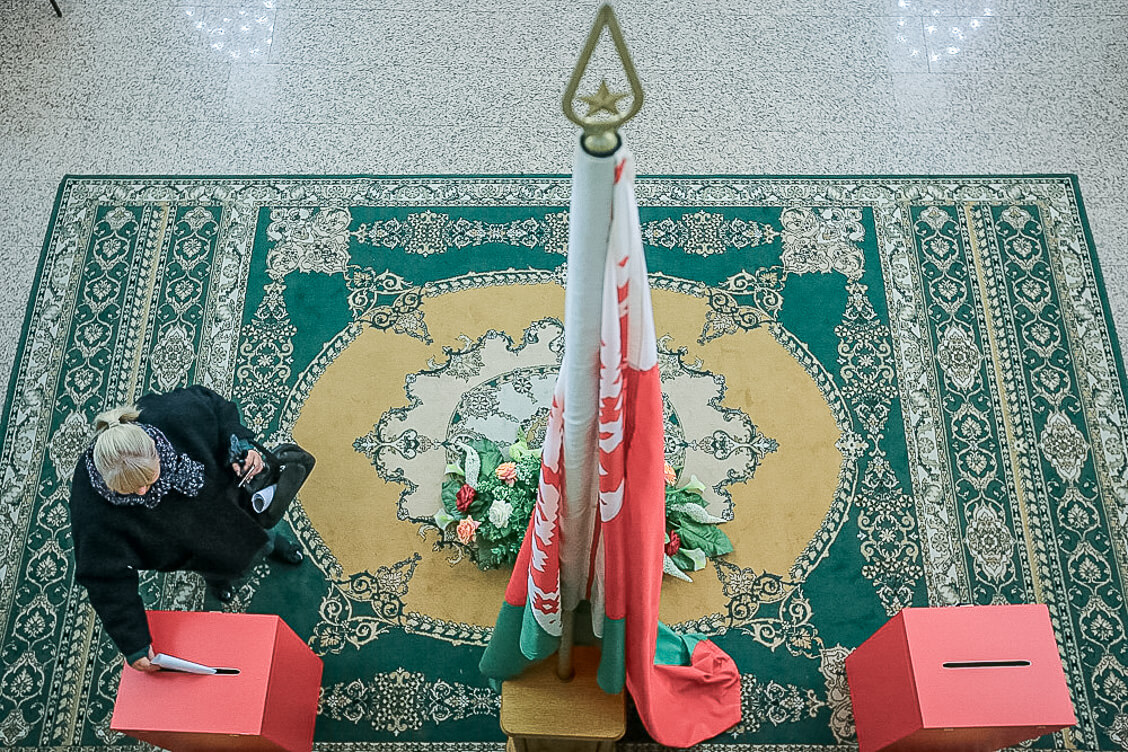In its domestic and foreign policy, Minsk is guided by Moscow and adopting its practices. Most likely, Alaksandr Łukašenka will use the experience of Russia’s recent presidential ballot, dubbed “Putin’s election” by opponents of the Russian president, to secure re-election next year.

Western governments almost unanimously denounced Russia’s presidential election as a sham. Vladimir Putin seized the opportunity to demonstrate “popular support” for him, for the war he unleashed against Ukraine and for his policy of radical confrontation with the West.
Although the outcome was predictable, the numbers announced by Russia’s central election commission — 87.28 percent of the vote for the incumbent with a turnout of 77.49 percent – surprised many.
However, the election will be remembered not only for the alleged record support for Putin, but also for the death of opposition politician Alexei Navalny and the disqualification of government critics from the race. What can Minsk learn from Putin’s election?
Will Łukašenka dare to break Putin’s record?
According to official data, Putin won 76.69 percent of the vote in the 2018 presidential election, with a turnout of 67.54 percent. In the 2020 presidential election, Łukašenka won 80.10 percent, with a turnout of 84.05 percent, according to the central election commission.
Belarus tends to report a higher voter turnout (over 80 percent and sometimes over 90 percent) and a higher level of support for the incumbent (often over 80 percent). Łukašenka’s best result was 83.47 percent in 2015.
Putin’s lower figures until recently were probably an attempt to show a relatively “civilized” result as he was still concerned about possible reactions abroad.
In 2024, these considerations completely lost their significance, resulting in an alleged 87.28 percent for Putin, which Łukašenka called a “stunning” result.
Łukašenka can break Putin’s record next year. A triumph with over 90 percent would not be a big surprise in Belarus.
Navalny’s death: both leaders enjoy impunity
Navalny’s death might have sparked mass protests but did not. Western leaders made strong-worded statements holding Putin responsible for the tragedy, while US President Joe Biden met with Navalny’s widow, Yulia.
However, the sanctions that followed mostly targeted Russian prison officials and did not affect the Kremlin.
Both Putin and Łukašenka may take the West’s weak response as proof that they should not expect severe punishment for killing their opponents. The death of political prisoners is not new to Belarus – at least five have been reported.
Prominent prisoners are surviving not because Minsk exercises caution, but because it wants to use them as bargaining chips in possible future dealings with West.
Dummy candidates?
The Kremlin’s choice of dummy candidates for Putin was based, among other things, on lessons learned from Belarus in 2020.
Yekaterina Duntsova, projected as Russia’s Śviatłana Cichanoŭskaja, was not even allowed to collect signatures.
Anti-war candidate Boris Nadezhdin was allowed to collect signatures but later disqualified.
Nikolai Kharitonov, Leonid Slutsky and Vladislav Davankov were registered as candidates because the Kremlin fully controls pseudo-opposition political forces.
Minsk also picks dummy candidates. In 2001 and 2006, it was Siarhiej Hajdukievič, leader of the Liberal Democratic Party (LDP), and in 2010, ex-MP Viktar Ciareščanka.
In 2015, two figureheads featured on the ballot, Hajdukievič and pro-Russian Mikałaj Ułachovič. In 2020, spoiler candidates Siarhiej Čeračeń, of the Belarusian Social Democratic Hramada, and former MP Hanna Kanapackaja failed to take votes away from Cichanoŭskaja.
How many candidates will be registered in 2025? During Łukašenka’s rule, presidential elections were held five times, twice with four candidates on the ballot (2006, 2015), once with three (2001) and once with five (2020). In 2010, there were as many as ten candidates.
The 2015 race was the easiest for Łukašenka. It passed off peacefully without protests, which are traditional for Belarus.
Hajdukievič and Ułahovič created the façade of democracy.
Some opponents voted for Taćciana Karatkievič, of “Tell the Truth!”, while others, considering her platform too moderate, called for a boycott.
If Łukašenka runs in 2025, Aleh Hajdukievič, the current leader of the LDP who considered a bid in 2020, could be a dummy candidate.
The Communist Party remains a major opposition force in Russia. It was represented by Kharitonov in the presidential election.
In Belarus, the Communist Party is part of the government system, so, if necessary, it can field a stooge.
Belarusian Davankov is unlikely
Davankov cast himself as an alternative candidate in Russia. He won over some opponents only to declare his admiration for Putin and support for his war in Ukraine afterward.
The potential candidates for the role of Davankov in Belarus could be Kanapackaja and Čeračeń (the latter has even declared his desire to run in 2020), as well as Juryj Vaskrasienski, a former opposition activist turned propagandist.
Čeračeń, Kanapackaja and Vaskrasienski have disappeared from the political scene. Łukašenka will probably not dare to let them run.
The Belarusian ruler has already made it clear that he will run next year. The race will be held according to the principle “do it like Russia, do better than Russia”.
Łukašenka may manufacture a landslide victory, possibly with an even more “stunning” result than Putin’s.